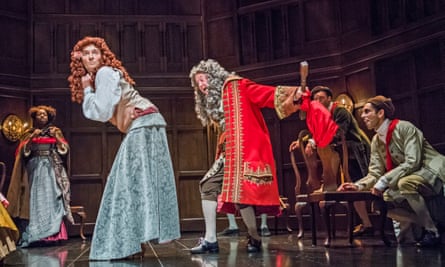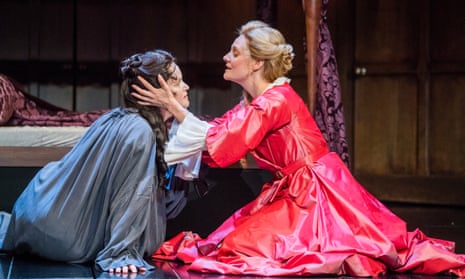Romola Garai plays the scheming Sarah Churchill, Duchess of Marlborough and intimate friend of Queen Anne, in the London run of Helen Edmundson’s play, first seen at Stratford with Natascha McElhone as Sarah. Garai offers an excellent mix of slyness and sensuality, and she is strongly matched by Emma Cunniffe as the obdurate, pious Anne. The rare pleasure, however, lies in seeing a history play in which two determined women are engaged in a battle for power; you have to go back to Schiller’s Mary Stuart or Robert Bolt’s Vivat! Vivat! Regina for comparable examples.
Edmundson has a lot of history to get through: the growing opposition of Whigs and Tories, the anti-French war of the Spanish succession, the 1707 union of Scotland and England, the emergence of scurrilous, partisan popular journalism. But the necessary background information is mostly conveyed with deft clarity. My main reservation concerns the musical interludes showing the leading literary figures of the time engaged in vicious lampoons of Anne, the Duke of Marlborough and whoever happens to be in power. The lyrics are not always clear, and a major figure like Daniel Defoe, who did more than anyone to chart the condition of England, is reduced to the role of a boozy hack.
Edmundson’s strength lies in capturing the contrast between the two formidable women at her story’s centre. Garai’s Sarah has glamour, cunning and position, as the wife of Anne’s most potent general, on her side. Garai also brings out Sarah’s sexual power over Anne: there is a telling scene where she grants Anne a hesitant kiss, curls up in bed beside her and extricates herself at the first opportunity. But the play is also a study in the overweening arrogance of a woman who, comparing herself to Anne, says “I am so much more than her” yet recklessly overplays her hand.

The real surprise lies in the play’s portrait of Anne. So often seen as plump, dowdy and dull, she is shown instead to be a woman who overcame her initial shyness to turn into a resolute queen. Cunniffe has no inhibition in depicting Anne’s physical problems: the reddened, gout-ridden ankles, the stiff gait, the left hand that clutches her side as an indication of constant pain. But while Anne is emotionally dependent first on Sarah and then on Mrs Masham, who supplants her, Cunniffe admirably suggests that she grows into the role of monarch through her unwavering faith and her belief in the hereditary principle. If anything, the play confirms the view of the historian GM Trevelyan that Anne was a far better monarch than her shifty Stuart predecessors.
We don’t see much of her subjects, but we do get a gripping contest between two equally determined women. Natalie Abrahami’s production for the RSC keeps the action moving and Hannah Clark’s design shows power battles being conducted in claustrophobic, panelled rooms. There are also good supporting performances: James Garnon as the speaker of the Commons, Robert Harley, is the embodiment of Tory deviousness; Richard Hope as the lord treasurer, Sidney Godolphin, exudes Whiggish loftiness; and Beth Park is quietly insidious as the fast-rising Mrs Masham. Edmundson’s play may be a history lesson, but it rescues Anne from the shadows and offers a rousing hymn to female agency.

Comments (…)
Sign in or create your Guardian account to join the discussion